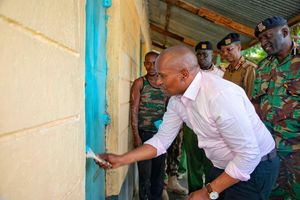
Striking doctors in a procession along Uhuru Highway in Nairobi on April 9, 2024.
The government’s refusal to give doctors a salary increase because the country couldn’t afford it and Kenya needs to live within its means is not fair. It is asking one cadre of workers to carry the can for the rest—take a hit for the team, if you like.
Almost all civil servants got an increase of between seven per cent and 10 per cent last year. Teachers, police, military and county workers got a Sh65.8 billion raise. The government will spend Sh136 billion in salary increments for civil servant by the end of the next financial year.
How is this living within our means?
First of all, let me clarify that I fear doctors—as a group. There are absolutely nice doctors that I have encountered, who have taken very good care of me, but in general, we have a relationship of trauma, OCD and every kind of emotional instability.
To compound the white coat phobia, I suspect that some doctors—a few, not many—if you go to them with a complaint, when they look at you they do not see your aching hip; they see the fourth floor slab of their upcoming apartment block in Pangani. Care, in that case, becomes primarily an exercise in managing revenue streams, not necessarily restoring your health.
The fact that they are rich and some are money-minded, however, does not mean they should not be treated fairly.
Government salaries are a tale not of Robin Hood but of ‘Robbing Hood’ and poor taxpayers: The accounts of public servants are swimming in ‘job satisfaction’.
Many do not go to work to serve the public—there are exemplary public servants who do—but to mint millions from us broke, struggling taxpayers. Every year, we give these millionaires Sh1.1 trillion in salaries that some did not earn and few need.
Doctors did not start the wage inflationary pressure in this here economy; the government did by giving everyone else an increase, imposing new taxes and increasing existing ones.
I know that the President blocked salary increments for the big guns, particularly MPs and MCAs, which the country applauded. Deputy President Rigathi Gachagua’s pay was to rise from Sh1,227,188 to Sh1,367,348, a significant Sh140,160, certainly enough to keep Pastor Dorcas in toothpicks and olive oil for the month. The Attorney-General and cabinet secretaries lost Sh24,000, enough for beard oil for the ladies and gentlemen.
The President is right, of course. We can’t be spending 43.5 per cent of our taxes paying salaries; it is way beyond what the country can afford with any chance of investing in development and it also breaks the law. But are salaries the biggest issue?
The budget for 23-24 Financial Year is Sh4.449.4 trillion, against normal revenue of Sh2 trillion. We are planning to spend a lot of money that we don’t have. Recurrent expenditure will take Sh1.5 trillion, most of it salaries, while the development budget is Sh718 billion. The big guy is, of course, debt, which will take Sh1.836 trillion, Sh850 billion being principal redemption and Sh775 billion interest.
In terms of priorities, education takes 27 per cent of the budget, a good chunk of it to pay teachers. Energy, ICT and infrastructure comes second, at 19 per cent, and public administration and international relations is the third-most important, at 14 per cent. Among the low priorities are national security, at eight per cent, water and protection of the environment, at five per cent, and agriculture, rural and urban development, at four per cent.
The elephant in the room is that the government is a dense, expensive, opaque system driven to the ground by inertia and whose master is, certainly, not the people. If you want to change it, you can’t go in without a comprehensive plan, addressing each moving part to ensure they don’t knock on one another and cancel out progress. If you want to increase salaries, you have to anticipate the full range of reactions.
Secondly, to arrive at a cheaper, more efficient system, you have to reimagine the entire structure—what you want it do, how it should work and what it will need. A good way of doing that is automating a lot of routine decision-making and putting AI at the heart of functions. You can cut corruption and waste by letting the robots run a lot of the processes and make many of the decisions. You don’t let the systems research and recommend options to an officer who has a construction project which needs sand.
A comprehensive audit, by a solid international agency, of Kenya’s national debt—how it was contracted, disbursed and spent—is a very obvious starting point for dealing with the current situation and establishing a culture of integrity and transparency in that area.
Lastly, where a government puts public money must have some relationship with the country’s most pressing needs. For example, what do we need most today, when we are impoverished by taxes, levies and high cost of living and our debt is so bad that we have teetered on the verge of default. A new airport?
- Mr Mathiu, a media consultant at Steward-Africa, is a former Editor-in-Chief of Nation Media Group. [email protected].










